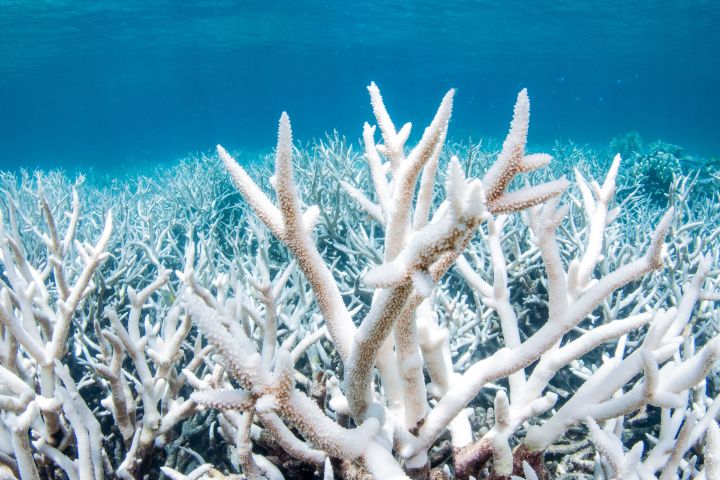The Crisis of Coral Bleaching: A Call to Action

Understanding Coral and Its Importance
Corals, relatives of jellyfish and sea anemones, are fascinating invertebrates belonging to the large group called Cnidaria. These colonial organisms consist of numerous individual polyps, each a clear, tube-shaped structure with a mouth surrounded by tentacles. Hard corals, known for forming reefs, create limestone skeletons by extracting calcium from seawater, while soft corals, like sea fans and sea feathers, have a more feathery appearance.
A vital aspect of coral life is their symbiotic relationship with microscopic algae called zooxanthellae. These algae reside within coral tissues, providing corals with their vibrant colours and essential nutrients through photosynthesis. This mutually beneficial relationship is crucial for the survival and health of coral reefs.
What Is Coral Bleaching?
Coral bleaching occurs when corals expel the zooxanthellae living within their tissues, often due to stress. This expulsion causes corals to lose their colour and turn white, revealing their calcium carbonate skeletons. While bleached corals are not immediately dead, they are significantly more vulnerable to starvation and disease, making their recovery uncertain.

Causes and Consequences of Coral Bleaching
The primary cause of coral bleaching is heat stress from elevated water temperatures. A mere one-degree Celsius increase over a few weeks can trigger bleaching. Other factors include increased UV radiation, pollution, runoff, overexposure to sunlight, and extreme low tides. For instance, in 2005, the U.S. lost half of its coral reefs in the Caribbean due to a massive bleaching event driven by thermal stress. Interestingly, not all bleaching is due to warm water; cold-water events, like the one in the Florida Keys in 2010, can also cause bleaching.
The Global Impact and Urgency of Action
For decades scientists have warned us of the effects of Coral Bleaching, and it seemed the exposure to this issue hit a high years ago, however, the situation remains dire and the problem has not solved itself, just because major media outlets and social media have stopped ‘trending’ the subject. The Great Barrier Reef and other coral reefs worldwide are currently experiencing severe bleaching events. According to the National Oceanic and Atmospheric Administration (NOAA), we are in the midst of the fifth global bleaching event, expected to affect more reefs than ever before.
The economic value of coral reefs is immense, estimated at $2.7 trillion annually, supporting millions of people and protecting coastal areas.
Despite efforts to mitigate climate change, nations continue to burn fossil fuels, exacerbating the problem. Substantial coral death has been confirmed worldwide, with significant losses in regions like Florida, the Caribbean, and The Great Barrier Reef - one of the most biodiverse ecosystems, suffering exponentially.

Hope Through Resilience and Innovation
While the outlook is grim, there is hope. Corals can recover from bleaching if water temperatures drop and conditions stabilise. Scientists are exploring innovative solutions, such as breeding heat-tolerant coral species and assisting coral migration to cooler waters. However, these efforts are limited by various environmental factors, including ocean acidification, which hinders coral growth.
Urgent global action is necessary to reduce carbon emissions and future bleaching events. As environmental ambassadors, we at CaliWoods are committed to protecting our oceans and promoting sustainable living. By raising awareness and making conscious choices, we can contribute to the resilience and recovery of our precious coral reefs.
How You Can Help
Reducing your carbon footprint, supporting sustainable products, and advocating for stronger environmental policies are crucial steps in the fight against coral bleaching. By choosing eco-friendly products and reducing plastic pollution, you can help alleviate some of the key stressors on coral reefs.
For more information on how you can help and to explore our eco-friendly products, visit the CaliWoods website. Together, we can make a difference and protect the vibrant underwater ecosystems that are vital to our planet's health.
Further reading?
Read Graham Readfearn’s recent article for The Guardian - “Fifth mass coral bleaching event in eight years hits Great Barrier Reef, marine park authority confirms”
References:
- Barrierreef.org - "What is Coral Bleaching?" Barrier Reef.
- Oceanservice.noaa.gov - "What Causes Coral Bleaching?" NOAA.
- NY Times Article - "The Widest-Ever Global Coral Crisis Will Hit Within Weeks, Scientists Say" by Catrin Einhorn.
- NOAA and International Coral Reef Initiative - "Current Global Bleaching Events" NOAA Coral Reef Watch.
- Tags: Basic Eco Tips Recent
0 comments

